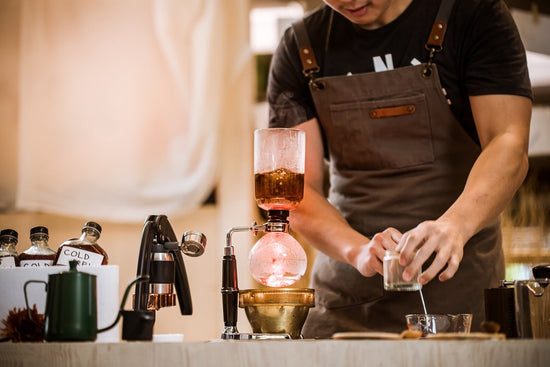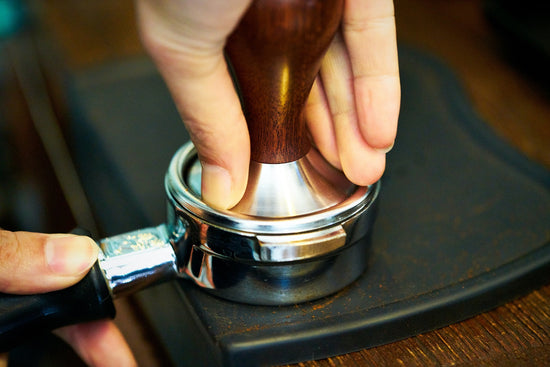Banish Bitter Coffee! Brewing a Delicious Cup Every Time
Ah, coffee. That invigorating aroma, the satisfying warmth, the delicious taste – a true cornerstone of many a morning (and afternoon) routine. But what happens when that anticipated deliciousness turns into a bitter coffee disappointment?
We've all been there. You stroll into a cosy café, the air thick with the promise of a perfect cup. You order your usual, anticipation brimming. Then, the first sip – a harsh bitterness that leaves you wincing. What went wrong?
The culprit, my friends, is often over-extraction. This simply means that the brewing process has pulled too much flavour out of the coffee grounds, resulting in that unpleasant bitterness. But fear not, for the solution lies in understanding the factors that lead to over-extraction.
Grind Size: The Great Equaliser
One of the most common culprits is the grind size. Think of it like this: the finer the grind, the more surface area is exposed to the water, leading to faster extraction. If your grind is too fine, it's like throwing open the floodgates – too much bitterness is released too quickly.
The fix? Use a coarser grind! This creates a barrier, allowing the water to extract flavour more slowly and evenly. Different brewing methods require different grind sizes, so a little research goes a long way. For example, a cafetière requires a coarse grind, while a espresso maker needs a much finer one.

Quantity Quandary: Finding the Golden Ratio
Another factor to consider is the coffee-to-water ratio. Using too much coffee can overwhelm the water, again leading to over-extraction and bitterness. Here at Redber, we're strong advocates for precision brewing. Invest in a kitchen scale and experiment with the recommended ratios for your chosen brewing method. A little experimentation goes a long way in finding your perfect cup.
Freshness is Key: From Bean to Cup
The age of your coffee beans also plays a crucial role. Freshly roasted beans are brimming with flavour and aroma. However, over time, they lose their magic and become stale. The result? A dull, bitter brew.
Here's the golden rule: buy whole beans from a reputable roaster (like us, of course!) and grind them yourself just before brewing. This ensures maximum freshness and flavour in every cup. Store your beans in an airtight container away from light and heat to keep them happy. And remember, aim to use your beans within four weeks of roasting for the best results.

"There's nothing better than a bitter cup of coffee"
Temperature Tantrums: Finding the Sweet Spot
Water temperature also plays a vital role. Water that's too hot can scald the coffee grounds, extracting harsh bitterness. For most brewing methods, the ideal temperature is between 92-96°C (198-205°F). For an AeroPress, however, things get cooler. Aim for 80°C (176°F) for dark roasts and 85°C (185°F) for light roasts. Using a thermometer ensures you're hitting the sweet spot for optimal flavour extraction.

H2O Hero: The Power of Pure Water
The water you use can also make a difference. Hard water, with its high mineral content, can react with the coffee, leading to a bitter taste and even scale build-up in your equipment. The solution? Use filtered or bottled water for brewing. The cleaner the water, the purer the coffee flavour.

Cleanliness is Next to Coffee Bliss
Finally, don't underestimate the importance of clean equipment. Coffee oils and residues can build up over time, affecting the taste of subsequent brews. Make sure you clean your coffee maker regularly according to the manufacturer's instructions. A sparkling clean machine equals a sparkling clean cup!
By understanding these factors and making small adjustments, you can transform your coffee experience from bitter disappointment to delicious delight. Remember, coffee brewing is an art, and with a little practice, you'll be a master barista in no time, crafting perfect cups that tantalize your taste buds every morning.
Bonus Tip: Embrace Experimentation!
The beauty of coffee is its versatility. With different brewing methods, grind sizes, and bean origins, there's a whole world of flavours waiting to be explored. Don't be afraid to experiment! Try a new bean, adjust your grind size, or explore a different brewing method. You might just discover your new favourite cup!
Here at Redber Coffee, we're passionate about helping you brew the perfect cup every time. We offer a wide selection of freshly roasted, speciality-grade beans, brewing equipment, and expert advice.
Frequently Asked Questions
1. My coffee tastes bitter, could it be the grind size?
- Absolutely! A grind that's too fine can lead to over-extraction, resulting in bitterness. Try a coarser grind for a smoother, less bitter cup.
2. How do I know what grind size is right for my brewing method?
- Different brewing methods require different grind sizes. A cafetière needs a coarse grind, while a stovetop espresso maker needs a much finer grind. We recommend researching the recommended grind size for your specific brewing method.
3. I'm using a lot of coffee, is that why my coffee is bitter?
- It could be! Using too much coffee can overwhelm the water, leading to over-extraction and bitterness. For a more balanced cup, try using a scale to measure your coffee and water according to the recommended ratio for your brewing method.
4. How long will coffee beans stay fresh?
- Freshness is key for delicious coffee! Whole beans stay fresher for longer than pre-ground coffee. Ideally, use your beans within four weeks of roasting for the best flavour. Store your beans in an airtight container away from light and heat to keep them happy.
5. How often should I clean my coffee maker?
- Coffee oils and residues can build up in your coffee maker over time, affecting the taste of your coffee. Make sure to clean your machine regularly according to the manufacturer's instructions. A clean machine equals a clean and delicious cup!
Products Featured In This Blog





2 comments
Finding the right coffee for your taste can definitely be a bit of trial and error, but there are a few ways to minimise the risk of wasting coffee you won’t enjoy. First, consider starting with taster packs– we offer a range of these, so you can try different flavours and roasts without committing to a large bag. You can also explore our coffee quiz to match you with coffees based on your preferences, like flavour notes or roast levels.
How can I find out which coffee is to my taste without wasting money and coffee, on coffee I do not like and will never use.